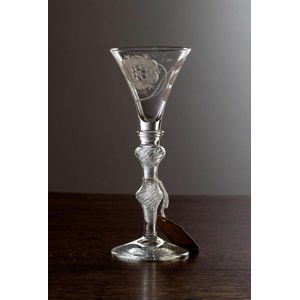Triple-Knopped Air Twist Wine Glass, English, 1750
You must be a subscriber, and be logged in to view price and dealer details.
Subscribe Now to view actual auction price for this item
When you subscribe, you have the option of setting the currency in which to display prices to $Au, $US, $NZ or Stg.
- Air Twist - An air twist is a decorative feature found on some types of glassware, including Georgian drinking glasses. It is created by twisting the glass while it is being blown, which creates a spiral pattern of ridges or rings around the stem of the glass. The air twist is typically made by a skilled glassblower using a hot glass rod to shape the glass. It is a decorative feature that adds visual interest to the glass. Georgian glassware is known for its high quality and intricate design, and the air twist is just one of the many decorative elements that may be found on Georgian drinking glasses.
- Twist - A rod of glass in which there is one or several threads or tapes of coloured glass, or bubbles of air embedded, which is then twisted to give an attractive appearance. The technique is mostly associated with the stems of Georgian glasses. The technique was in use from about the 1740s to the 1760s.
Collectors have identified over 150 variations of twist decoration. One of the most common is the air twist which as the name implies, has one or more columns of air embedded within the rod. A colour twist has one or more coloured tapes, usually opaque but sometimes translucent. other common types of twist include cable, corkscrew, enamel, gauze, lace, opaque and thread. - Circa - A Latin term meaning 'about', often used in the antique trade to give an approximate date for the piece, usually considered to be five years on either side of the circa year. Thus, circa 1900 means the piece was made about 1900, probably between 1895 and 1905. The expression is sometimes abbreviated to c.1900.
This item has been included into following indexes:
Visually similar items

A Jacobite engraved spiral twist double-knopped wine glass, English, circa 1750, 17 cm high. Provenance: Christies, London, Standish Collection, 5 November 1998

A George III multi-spiral wine glass, English, 18th century, 18 cm high. Provenance: Montague Sainsbury Collection, Christie's, 6 July 1999, Lot 486

An air twist wine glass, English, circa 1750, 18 cm high. Provenance: Christies, London, Standish Collection, 5 November 1998

A Georgian coloured twist wine glass, English, 18th century, 16 cm high. Provenance: Montague Sainsbury Collection, Chirstie's, 6 July 1999, Lot 489
